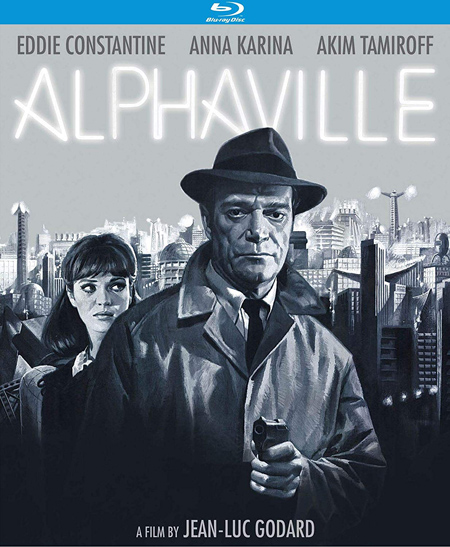
“THE
FUTURE IS NOWâ€
BY RAYMOND BENSON
If
you’re familiar with the work of that French New Wave revolutionary, Jean-Luc
Godard, you may not think that he was the type of filmmaker who would make a
science fiction film. He did, though, in 1965, and he merged the genre with
that of film noir to create a unique hybrid that also contains many of
the jarring stylistic elements with which Godard loves to bombard his
audiences.
Godard
was the “bad boy†of the French New Wave. He seemed to take pleasure in
angering viewers and being controversial by choice (unlike, say, Truffaut,
whose films were decidedly more commercial and accessible). That said, though,
there is much in Godard’s canon that can be not only shocking and challenging,
but truly wonderful.
Such
is the case with Alphaville.
Western
audiences may not be familiar with the character of Lemmy Caution. He’s a
private investigator of the Philip Marlowe/Sam Spade type, an American, created
by British writer Peter Cheyney, and featured in nine novels published in the
1940s as pulp P.I. mysteries. The character also appeared in approximately
fifteen motion pictures, made mostly in France, and were never on the radar of
English-speaking viewers. American tough-guy actor Eddie Constantine moved to
France after he found that he couldn’t get work in Hollywood, and there he
enjoyed a career playing the kinds of roles one might associate with Robert
Mitchum or Dennis O’Keefe. Constantine played the role of Lemmy Caution in seven
French pictures, made as hard-boiled crime dramas, before Jean-Luc Godard made
his version of a Lemmy Caution movie (how Godard obtained the rights to
the character to make an art film that turns the detective genre on its head is
also a mystery!).
Alphaville
takes
place in an unspecified dystopian future—Alphaville, the city, looks like
Paris, and maybe it is, but now it’s run in an Orwellian-style aristocratic
fashion. A computer known as Alpha 60 runs everything (and narrates the film),
and people are not allowed to show emotion of any kind. Lemmy comes to
Alphaville to destroy Alpha 60 and its creator, a shadowy scientist named
“Professor von Braun†(is the similarity to Werner von Braun
intentional?—probably!). Lemmy meets up with von Braun’s daughter, Natacha
(Anna Karina) and, with an uneasy partnership, sets out on his convoluted
mission.
The
picture uses many traits of classic film noir (expressionistic lighting,
trench coats, fedoras, handgun violence, a femme fatale, and good old
cynicism and angst) with the paranoia and highly regulated environment of the dystopian
future urban setting. The “futuristic†effect was accomplished by filming on
location at “modern†buildings (for the time), providing the movie an added
thematic aspect that we are already “living in the future.†Godard continues to
rely on his signature radical editing techniques that can be discordant, but
here it all works. In fact, Alphaville is one of the more enjoyable
Godard films from the 1960s, albeit not something that would play well in
Peoria, Illinois.
Kino
Lorber Classics has released a restored 1920x1080p transfer that looks
remarkably good, and it also features an audio commentary by noted film
historian Tim Lucas. Extras include a Colin McCabe introduction to the picture,
an interesting interview with Anna Karina (who was married to Godard during the
director’s first five years of filmmaking), and the theatrical trailer.
Alphaville
is a
striking, oddball of a film that gets better with each successive viewing.
CLICK HERE TO ORDER FROM AMAZON